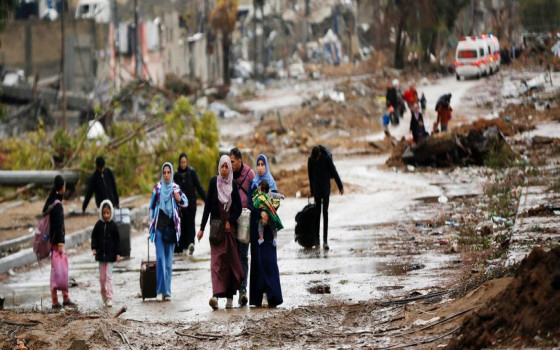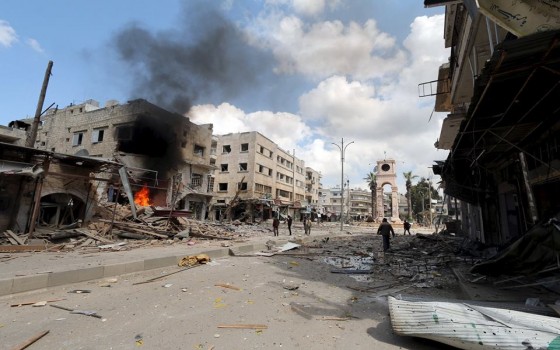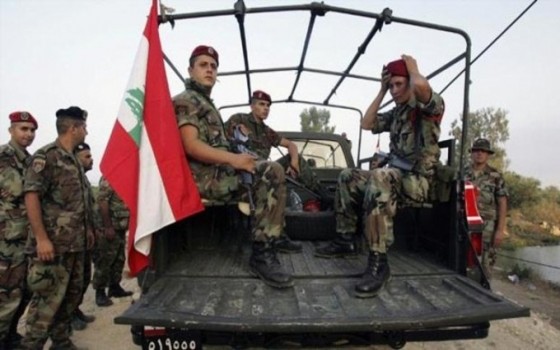
UN organizations apologize to Palestinian mothers for the world's failure to them and their children. Residents struggle to survive. Warning of the consequences of the Israeli escalation. UNRWA calls on Arab countries to stand in solidarity with it.

- Europe and Arabs
- Friday , 5 September 2025 9:43 AM GMT
Gaza - New York: Europe and the Arabs
After spending nine days in Gaza City, which has become the last refuge for families in the northern Gaza Strip, UNICEF spokesperson Tess Ingram warned that the city is "rapidly becoming a place where childhood cannot survive," describing it as a city of "fear, flight, and funerals."
Speaking to reporters in New York via video link from the Strip, Ingram said that Gaza City's youngest and most vulnerable residents are struggling to survive due to the collapse of basic services. She stressed the need to do everything possible to prevent an imminent intensified Israeli military offensive to avert "an unimaginable tragedy." However, she said, "The unbelievable is not imminent; it is already here. The escalation is underway."
"Famine is everywhere"
The UNICEF spokesperson added that malnutrition and starvation are weakening children's bodies, while displacement deprives them of shelter and care, and shelling threatens their every movement. “This is what famine looks like in a war zone, and I found it everywhere I looked in Gaza City,” she added. “An hour in a nutrition clinic is enough to erase any question of famine—crowded waiting rooms, weeping parents, children struggling with illness and malnutrition, mothers unable to breastfeed, and infants losing their sight, hair, and ability to walk.”
Ingram said the horrors in Gaza have become so prolonged that children are relapsing just weeks after completing malnutrition treatment due to the persistent shortage of food, clean water, and other basic supplies.
She emphasized that without immediate and increased access to food and nutritional treatment, “this recurring nightmare will worsen, and more children will starve to death. It is an entirely avoidable fate.”
She added: “Palestinian life is being dismantled here, regularly but steadily. The suffering of children in the Gaza Strip is not an accident; it is the direct result of choices that have turned Gaza City, and indeed the entire Strip, into a place where people’s lives are attacked from every side, daily.” Intensive, but Insufficient, Efforts
Ingram emphasized that UNICEF is doing everything it can to combat famine and meet the massive needs. She explained that over the past two weeks, the organization has been able to provide its partners with enough ready-to-use therapeutic food—the main treatment for malnutrition in children—to deliver to more than 3,000 severely malnourished children over the course of the six-week treatment period.
This comes alongside other emergency assistance for infants, mothers, and pregnant women, as well as temporary learning centers, child protection services, and other responses.
She emphasized that UNICEF is capable of exerting greater efforts and reaching every child in Gaza if its field operations are fully operational and sufficiently funded.
Inspired by Gazan Determination and Humanity
Tess Ingram reiterated UNICEF's calls for Israel to review its rules of engagement to ensure the protection of children, allow adequate aid into Gaza, and protect humanitarian workers and allow them to reach people in need wherever they are. She reiterated her call on Hamas and other Palestinian armed groups to release all remaining hostages.
She also called on the international community, especially influential states and stakeholders, to use their influence to end this situation, "because the price of inaction will be measured in the lives of children buried under the rubble, exhausted by hunger, and silenced before they had a chance to speak."
In response to journalists' questions about her feelings while working in Gaza and witnessing these conditions firsthand, Ingram said she found herself apologizing to many mothers over the past week for the world's failure of them and their children, describing the situation as heartbreaking.
However, she highlighted the tremendous "resilience and humanity" she witnessed in the Gaza community, explaining, "I don't think I could have held up as well as the people here under these circumstances. It's truly admirable, and I think that gives all of us [as humanitarian workers] the courage and determination to continue." The UN Human Rights Office expressed grave concern over the escalation of Israeli military operations in northern Gaza as part of "Israel's plan to completely control Gaza City, announced on 8 August."
Ajith Sungai, head of the UN Human Rights Office for the occupied Palestinian territory, said that the office's reports indicate that the escalation included extensive destruction of residential buildings in areas south of northern Gaza and northeast of Gaza City, resulting in civilian casualties and forced displacement.
Sungai told UN News that 813 Palestinians were killed, according to the Ministry of Health in Gaza, between 26 August and 1 September.
He said that reports indicate that approximately one million Palestinians remain in northern Gaza, "now being pushed into ever-shrinking areas in western Gaza under dire humanitarian conditions."
He stated that many are unable to move due to the lack of safe areas and the risks involved in moving from one place to another. He said that others remain trapped east of Gaza City and are unable to be reached by aid workers. The UN official said that Israeli military attacks on aid seekers continue across Gaza, while aid trucks face challenges entering the Strip. He stated that the UN Human Rights Office has recorded more than 2,146 deaths in the vicinity of the Gaza Humanitarian Foundation sites and along supply convoy routes.
West Bank
Songai noted an increase in reports in recent days about "the Israeli government's plans to 'impose sovereignty,' or in other words, formalize and further enshrine the annexation under Israeli law of the occupied West Bank or parts thereof." He said that any declaration of sovereignty over the West Bank would have disastrous consequences for the Palestinians, "of course on their right to self-determination, but also on their daily lives."
He said that imposing Israeli sovereignty and domestic law over the West Bank would facilitate further massive expansion of settlements, legalize existing outposts, and allow Israel full control—without any restrictions—over Palestinian natural resources.
Appeal to Arab States
In his address to the Council of the League of Arab States, the Commissioner-General of UNRWA called for solidarity with the agency, preserving its role in protecting the rights of Palestine refugees, and using all tools to end the unacceptable suffering in Gaza.
Commissioner-General Philippe Lazzarini's appeal came in his address to the 164th session of the Council of the League of Arab States, held at the ministerial level in the Egyptian capital, Cairo.
Lazzarini spoke of the deteriorating situation in the Gaza Strip and the occurrence of a "man-made famine" in the Gaza Strip, which is expected to spread rapidly. He said: "This is the direct and predictable consequence of the blockade and the deliberate restrictions on principled humanitarian organizations—including UNRWA—in the service of a mechanism that militarizes and weaponizes food aid. People in Gaza now have to choose between starving to death or being killed in desperate attempts to find food."
The Commissioner-General of the United Nations Relief and Works Agency for Palestine Refugees (UNRWA) added that journalists in Gaza are being targeted and killed to silence the last voices "covering international crimes."
Lazzarini turned to the occupied West Bank, saying that the Israeli army and armed settlers are committing horrific violence against Palestinians—"and annexation is now a declared political goal."
The UN official added that the world's indifference and inaction are shocking, amounting to complicity, and threatening the stability of the entire region.
Disinformation campaign against UNRWA
The suffering of Palestinians is exacerbated and intensified, Lazzarini said, by attacks on UNRWA staff and premises, as well as attacks at the political and legislative levels against the agency. He noted that more than 360 UNRWA staff members were killed in Gaza, and that most of the agency's buildings were damaged or completely destroyed.
He said that Israeli legislation prohibits the presence of international staff in the occupied Palestinian territory, adding that "a vicious global disinformation campaign has tarnished the agency's reputation and choked off critical funding" for its vital work.
Despite all these challenges, the agency's Palestinian staff have demonstrated "unparalleled" courage and dedication, allowing UNRWA to continue providing its vital services, including healthcare and education in Gaza and the West Bank.
Philippe Lazzarini warned that UNRWA's financial situation is catastrophic. He said that austerity measures will allow for the payment of salaries for September, but the financial outlook for the rest of 2025 is highly uncertain.
He concluded his remarks with three appeals:
First, he called on Arab states to demonstrate their solidarity with UNRWA, not only through political support, but also through strong financial support. Financial contributions from the region this year amounted to only 3% of the total contributions received by the Agency, a decrease of more than 90% compared to last year.
Secondly, he urged the preservation of UNRWA's role in protecting the rights of Palestine refugees.
Thirdly, he called on Arab states to use all legal, political, diplomatic, and economic tools at their disposal to end the unacceptable suffering in Gaza.
He stated that a ceasefire is imperative and stressed the need to allow UNRWA to deploy its expertise and unique aid distribution network to address the famine and provide essential humanitarian assistance. He emphasized that the time has come to act and save lives and secure the future of Palestine and the region.












No Comments Found